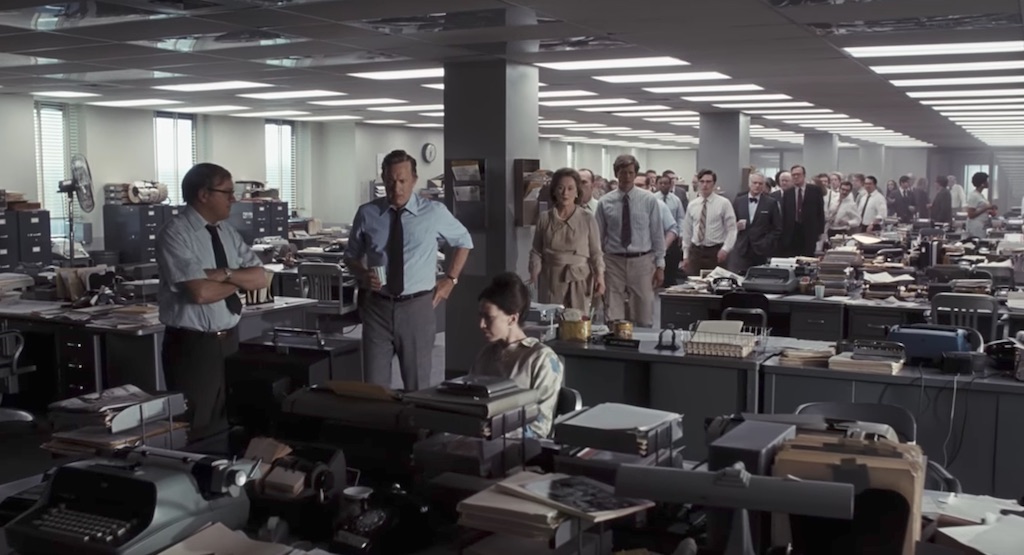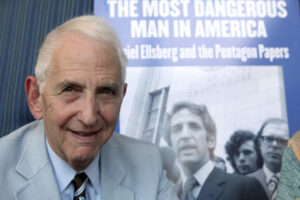‘The Post’ Feels Like Old Hollywood
Meryl Streep and Tom Hanks deliver smart, enjoyable entertainment in Steven Spielberg's Pentagon Papers potboiler. A scene from "The Post." (20th Century Fox)
A scene from "The Post." (20th Century Fox)
This Oscar season, 20th Century Fox assembles what has been called the Hollywood dream team for “The Post,” with Steven Spielberg directing Tom Hanks and Meryl Streep in a kinetic retelling of the Pentagon Papers saga that pitted Richard Nixon’s White House against the free press.
In 1971, disillusioned Rand Corp. researcher Daniel Ellsberg (Matthew Rhys) offers to The New York Times, and later The Washington Post, a large portion of a report commissioned by Secretary of Defense Robert McNamara (Bruce Greenwood). In it, he and others recognize in statements dating to 1965 that the Vietnam War is unwinnable. Yet they futilely pushed on, sacrificing the lives of thousands.
Streep plays Katharine Graham, who is waking when we first meet her, literally sitting up in bed with a start. At this point in her biography, she has been publisher of The Washington Post for eight years, a position for which the life of a socialite (who counts people like the Kennedys, Lyndon Johnson, Henry Kissinger and McNamara among her friends) has only partially prepared her.
She lives by the notion that quality journalism can drive profits at the Post, but so far, the books don’t bear her out, and an initial public offering of company stock looks like a last chance at solvency. When she hired Ben Bradlee (Hanks) as editor in chief in 1968, he was rumored to have worked for the CIA and had been a close confidant to John F. Kennedy, later publishing “Conversations With Kennedy” based on their relationship.
By the time Graham and Bradlee sit down to lunch in the film, Spielberg’s camera has been doing things we haven’t seen from it before. “The Post” is shot mise-en-scène, long gliding takes wherein pacing is governed by the performers rather than by edits. His camera snakes along at waist level through newsrooms, into offices for a sit-down, then out into the street, always busy and alive with an energy reflecting the movie’s abbreviated production schedule as well as the groundbreaking events it portrays.
Their lunch scene feels written for the stage, with mannered performances from Streep and Hanks that recall classic Hollywood. Dialogue-driven riffs, written by Josh Singer (a 2016 Oscar winner for the newsroom drama “Spotlight”) and producer-turned-writer Liz Hannah, are choicely worded and unfailingly polite, though anchored in conflict over how to cover the wedding of Patricia Nixon now that the Post has been banned from the White House. The point of the scene, and the nub of their disagreement, is best summed up by Bradlee: “We can’t have a president dictating to us our coverage just because they don’t like what we print about them in the newspaper.”
(“The Post” is rife with parallels between Nixon, a president who later levels an injunction against both The New York Times and The Washington Post, and our current president, who has labeled the press “the enemy of the American people.”)
After three straight days of reporting the Pentagon Papers, the Times is barred by Nixon’s Department of Justice from continuing the series.
(In real life today, some grumbling has come from the Times, which broke the original story and is wondering why the movie is told from the point of view of its rival.) With an injunction against the Times, Ellsberg turns to the Post in the person of assistant managing editor for national affairs Ben Bagdikian (Bob Odenkirk in a subtle performance), to whom he hands over 4,000 nonsequential pages.
In a moment reminiscent of classic Hollywood, writers and editors work all night in Bradlee’s living room to make the next day’s edition. Spielberg charges toward a Capra-esque finale, focusing on a hardscrabble team tirelessly toiling to beat the odds and bring the bad guys to justice.
As deadline approaches, Graham faces the key question: Will she print? Will she run with a story that no one else has, face severe legal jeopardy, maybe even jail time, or will she cave? It may not be the most difficult decision Streep has ever faced on the big screen (that would be “Sophie’s Choice”), but the dilemma is substantial enough to build the movie’s climax around.
That the National Board of Review named “The Post” best picture of the year should come as no surprise. Critics love movies with journalist heroes, somehow finding them self-validating. Even so, aside from “His Girl Friday” and “All the President’s Men,” most are crushing bores. Luckily, “The Post” does not have that problem.
Not since “Lincoln” has Spielberg elicited such subtle portrayals from his cast. The long takes required him to work with them in shaping performances that sustain throughout the scene rather than in pieces. Although Spielberg has worked with Hanks numerous times, “The Post” marks his first collaboration with Streep. The trio cultivates strong chemistry, always mindful of the line between Bradlee’s irresistible force and Graham’s coming into her own as an immovable object.
Streep achingly internalizes the blatant sexism Graham—a wealthy, educated and powerful woman—faces on a daily basis. Always condescended to and underestimated, she sums up her struggle with a quote by Samuel Johnson, “A woman’s preaching is like a dog’s walking on his hind legs. It’s not done well, but you are surprised to find it done at all.” The idea is crystalized by Spielberg in a brilliant shot as Graham approaches the board of the American Stock Exchange. Climbing a wide staircase, she passes through a throng of female assistants who stand outside the doors wherein their bosses, a sea of men in black suits, await.
As smart and enjoyable entertainment, “The Post” is the kind of movie the studios used to make, artfully written and performed, including relevant social themes and a dose of melodrama to put butts in the seats. But while it proudly displays its anti-Trump bona fides, it fails as resistance cinema, stirring the kind of soft fury one might expect from mollified Beverly Hills baby boomers.
Independent journalism is under threat and overshadowed by heavily funded mainstream media.
You can help level the playing field. Become a member.
Your tax-deductible contribution keeps us digging beneath the headlines to give you thought-provoking, investigative reporting and analysis that unearths what's really happening- without compromise.
Give today to support our courageous, independent journalists.








You need to be a supporter to comment.
There are currently no responses to this article.
Be the first to respond.